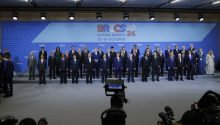by Pepe Escobar, Strategic Culture:

We will need weeks, months, years to fully grasp the enormity of what took place in Kazan during the annual BRICS summit under the Russian presidency.
For the moment let’s cherish arguably the most appropriate definition of BRICS as a laboratory of the future: this lab, against nearly insurmountable odds, is actively engaged in creating a Sovereign Harmonious Multi-Nodal World.
Of course the challenges are immense. In his post-BRICS assessment, when addressing the sustainability of supply chains, Deputy Foreign Minister Sergey Ryabkov – the top Russian sherpa throughout the year, performing impeccably – stressed the “unacceptability of illegitimate unilateral sanctions applied by the Western group against many members of BRICS, linking sanctions with the climate agenda and human rights.”
TRUTH LIVES on at https://sgtreport.tv/
This is only one of several topics of contention that the BRICS insist must be addressed as part of a – possible? – deep reform of the current system of international relations.
The extremely detailed – and quite polite – Kazan Declaration, outlining all that needs to be reformed, may not have been forceful enough to assuage the mounting anger and perennial fears expressed non-stop by the Global Majority.
Criticism that the Kazan Declaration in many aspects just replicates silver-wrapped blah blah blah peddled by the G7 and the G20 (whose summit, next month in Rio, is actually being hijacked by the G7) does proceed.
For a number of reasons, including internal disagreements, the BRICS – defined by President Putin as not an “anti-Western” but a “non-Western” group – are proceeding with extreme caution not to directly antagonize that dangerous cornered animal, the “rules-based international order” Hydra.
The Kazan Declaration is not a revolutionary document; rather it is a letter of intentions for the whole Global South.
It does not go against “global governance” and the “central role of the UN” – as much as the UN has been reduced to an empty shell, coerced by its dodgy deals with the World Economic Forum (WEF), WHO and NATO.
It does not go against the leading role of the IMF in global finance.
It does not go against the UN Agenda 2030 – redacted by the WEF and the Davos gang – for sustainable development supported by hazy “shareholders”, an euphemism for Big Pharma, Big Tech and Big Banking.
It does not go against the WHO and its “central coordinating role” in solidifying the “international pandemic prevention, preparedness and response system” – as in the next pre-planned/predicted pandemic is just around the corner.
And it does not go against the dreaded UN Pact for the Future, which is essentially the softly softly implementation of the Davos-penned Great Reset.
Lab moving to testing models non-stop
What must be scrutinized from now on is the “devil in the details” process of establishing facts on the ground – as in President Putin in Kazan suggesting a new BRICS funding/financing platform bypassing the IMF and the World Bank. That’s what establishing a post-Bretton Woods system means in practice.
It’s still a long way away. Kazan is just the departure station for the journey. When the BRICS+ high-speed train gets there – the current 9, plus still indecisive Saudi Arabia, plus the 13 new partners – it will be imperative to form a BRICS secretariat, and develop a joint, integrated Economic Development, Trade, and Defense policy.
And then, arguably in the next decade, the BRICS may finally agree on a New Reserve Currency – which may be called the virtual BRICS currency -, quite similar to the IMF’s SDR (Special Drawing Rights) mechanism, but totally independent from the IMF and the U.S. dollar: a currency based on the weighted average of all BRICS nations’ currencies.
Yaroslav Lissovolik has been a crack analyst of the BRICS evolution since the past decade. In a working lunch in Moscow nearly six years ago, he offered me a concise presentation of his idea of creating a BRICS currency called 5R – then based on the ruble, renminbi, real, rupee and rand.
Lissovolik has noted how BRICS in Kazan have expressed support to the WTO “as the core of a rules-based multilateral trading system” (translation: not rocking the boat for the moment).
BRICS also expressed support for the IMF “that is at the center of the Global Financial Safety Net of the world economy” – while asking for “expanding the share and the representation of the Global South” (that will fall on deaf Hegemon ears). BRICS also supports the G20 (let’s see what transpires in practice at the summit in Rio next month).
When it comes to the NDB – the Shanghai-based BRICS bank – now that’s where the action should be. Lissovolik noted how BRICS is making the right moves: asking for greater use by the NDB of national currencies (for the moment it’s a pitiful less than 30%); and inciting it to attract more members and finance more projects across the Global South.
Read More @ Strategic-Culture.org




